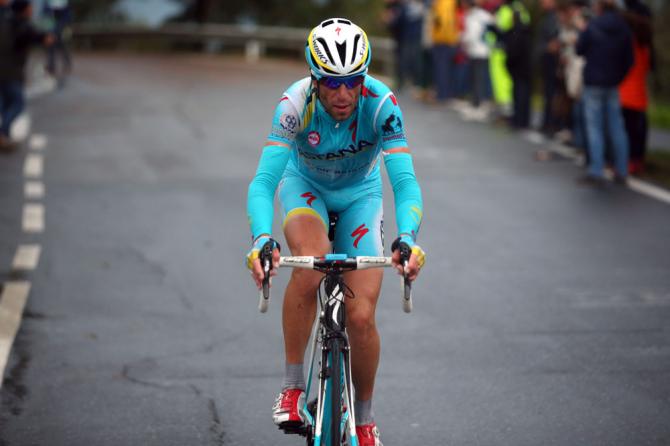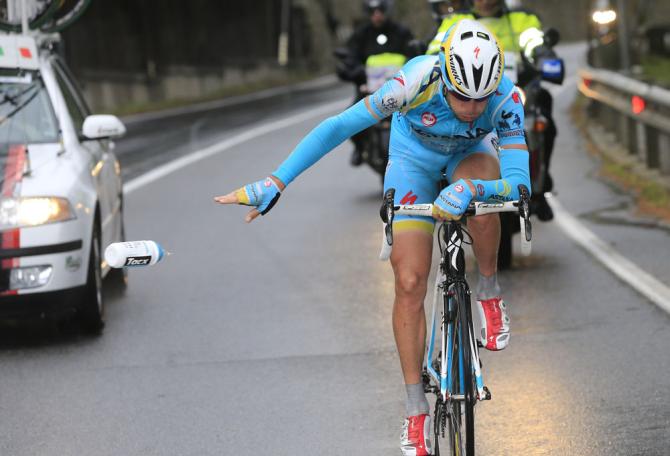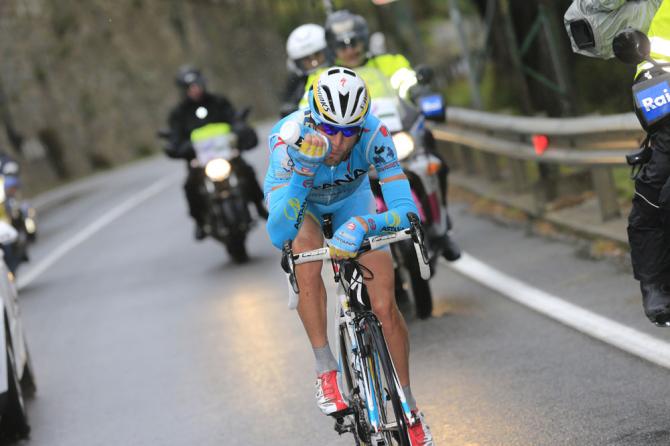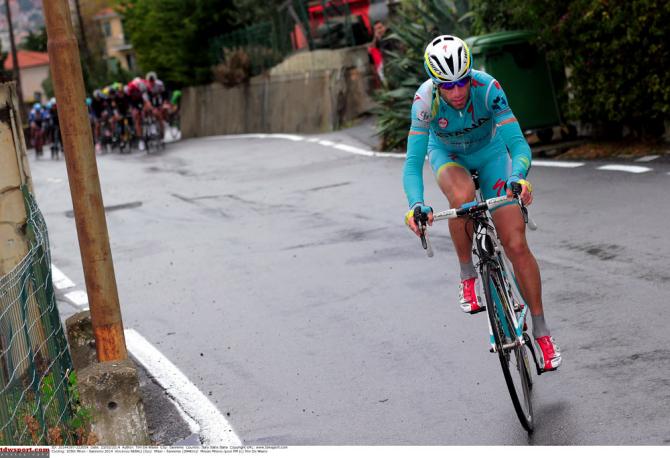Nibali laments lack of allies at Milan-San Remo
Astana rider’s solo move on Cipressa snuffed out in finale
The latest race content, interviews, features, reviews and expert buying guides, direct to your inbox!
You are now subscribed
Your newsletter sign-up was successful




The move had been all but advertised in the morning newspapers but there were still no takers when the blue jersey of Vincenzo Nibali bounded clear on the Cipressa in the finale of a rain-soaked Milan-San Remo.
Speaking beforehand, Astana manager Giuseppe Martinelli had predicted that in the absence of Le Manie, the Cipressa would prove more important than ever before given the amount of riders who needed to find a way of divesting the peloton of the pure sprinters.
Instead, Nibali was left to his own devices when he attacked three kilometres from the summit. At least three times, he turned and peered back into the gloom behind him in the forlorn hope of finding reinforcements before grinding on alone. Although Nibali briefly set Italian hearts aflutter by opening a gap of 50 seconds after the descent, he was ineluctably swept up on the lower slopes of the Poggio and finished the race in 44th place, 3:15 down.
“I had spoken with a lot of guys in the peloton, especially with [Peter] Sagan. He told me that he wanted to attack on the Cipressa but when I went myself, I saw that none of the riders who wanted to make the race hard on the Cipressa were following me,” Nibali said through chattering teeth as he sat on the steps of his team bus afterwards.
Nibali would later take to Twitter to bemoan the lack of aggression from his fellow non-sprinters, asking “where are the riders with the balls [tactfully represented by a pair of emoticons] of once upon a time?” before quickly stressing that his were words of encouragement rather than of criticism. He was diplomatic on the pavement of the Via Roma, however, when asked whether his rivals had been lacking the courage or the condition to track his move.
“Maybe it was a lack of courage, a lack of legs or maybe because of the cold, I wouldn’t know,” he said. “There were a lot of sprinters still there on the Poggio, like Cavendish, so I don’t know what happened behind. The word in the bunch was to try and make San Remo a lot more difficult in the finale because there wasn’t Le Manie or the Pompeiana this year.
“I think I did a good race and it would have been pointless for me to wait for the sprint. Maybe if I’d known it would be like that, I could have waited for the Poggio but it was very difficult. I was waiting for an ally and I turned around a few times to see if anyone was coming but there was nothing.”
The latest race content, interviews, features, reviews and expert buying guides, direct to your inbox!
Two years ago, Nibali had been joined by Fabian Cancellara on the offensive on the Poggio, and clearly expected the Swiss to be an ally of circumstance once again here. Cancellara held fire for the sprint, however, reasoning that his aggression had yielded only near misses since his 2008 victory, but the sequence continued, as he lost out to Alexander Kristoff (Katusha) and took his third 2nd place finish in four years.
“Maybe it would have been different if someone had come with me, especially Cancellara. After his various placings here over the years, I think he’ll be thinking about that again,” Nibali said, adding: “But it’s not that he threw away an opportunity, because he still took a fine second place and only Kristoff could beat him. It was still a great performance.”
Martinelli
Nibali’s manager Martinelli was more forceful in his declarations at the finish, lamenting to Cyclingnews that most of the contenders had seemed happy to race for positions in the top ten rather than take a risk to try and win Milan-San Remo.
“I think cycling is changing and people are only riding for places now, they’re not riding to win,” Martinelli said. “By not responding to an attack from Vincenzo, people who have finished second and third without winning Milan-San Remo – and who haven’t won it again this year even though they have the legs to do so – have shown that they don’t understand very much.”
Asked to name names, Martinelli said that he was “talking in general” and placing the lion’s share of the blame on the instructions the riders were receiving from their directeurs sportifs: “The problem is the guys driving in the team cars telling them to ride that way.”
After the descent of the Cipressa, Nibali had a lead of 47 seconds on the chasers and the speaker on the finish line in San Remo hopefully looked to build expectations among the gathered crowds that the Giro d’Italia winner could pull off a famous impresa.
“I believed I could do it because Martinelli was updating me on the radio and told me that I had 50 seconds, which was a decent gap,” Nibali said. “But it was hard to manage it and that’s normal after 270km: it’s difficult to have the legs to stay away.”
A final decision on Nibali’s participation in Critérium International is set to be made on Monday, but one certainty on the his programme is a spell at altitude at Mount Teide in the first two weeks of April in preparation for the Ardennes classics. With the Tour de France Nibali’s main goal in 2014, he has started the campaign more cautiously than last year, but Martinelli declared himself pleased with the omens from Milan-San Remo.
“I’m happy with how we rode today because we did what we wanted to do,” Martinelli said. “And to gain 50 seconds shows that Vincenzo was going very well. The pity is that there’s only one Nibali.”

Barry Ryan was Head of Features at Cyclingnews. He has covered professional cycling since 2010, reporting from the Tour de France, Giro d’Italia and events from Argentina to Japan. His writing has appeared in The Independent, Procycling and Cycling Plus. He is the author of The Ascent: Sean Kelly, Stephen Roche and the Rise of Irish Cycling’s Golden Generation, published by Gill Books.
